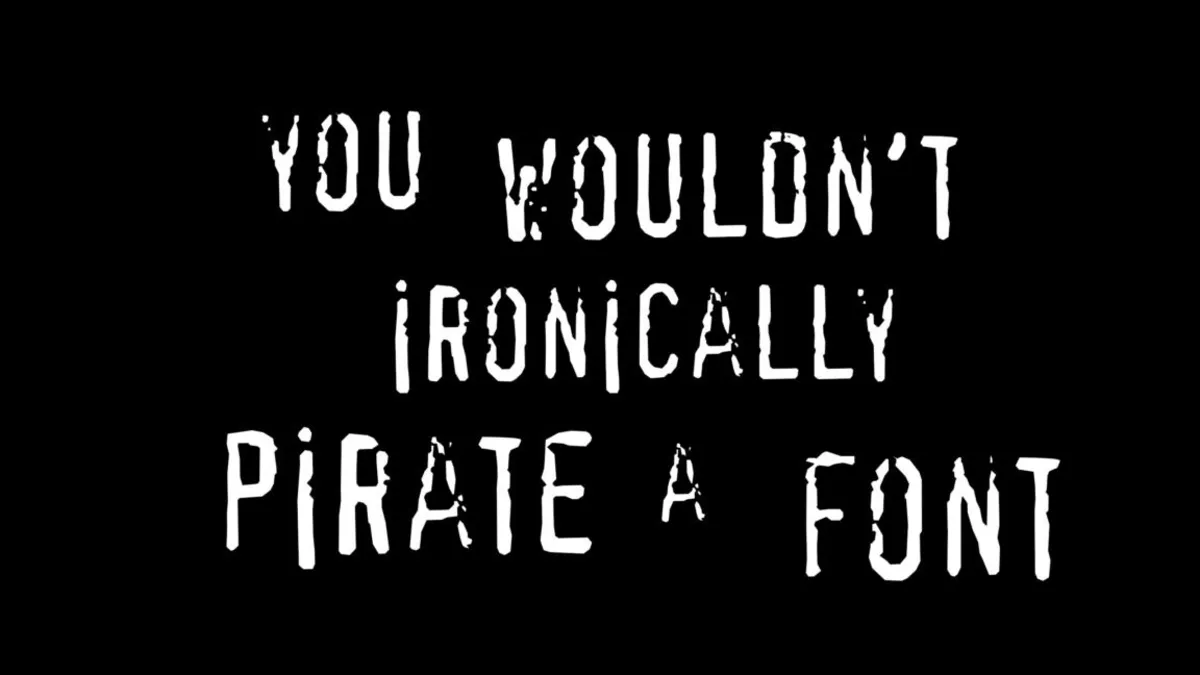
In the mid-2000s, the Motion Picture Association of America (MPAA) launched a widely known anti-piracy campaign encapsulated by the slogan, You wouldn't steal a car. This campaign, which ran from 2004 to 2008, aimed to deter movie piracy by drawing a parallel between stealing a car and illegally downloading films. However, recent inquiries have raised questions about the MPAA's adherence to its own anti-piracy principles, particularly regarding its use of fonts in the campaign.
The aesthetic of the MPAA's anti-piracy campaign was not particularly subtle. One striking advertisement featured a teenage girl clicking a large green "Download" button on a dubious website. As she did, bold white text appeared against a black background, declaring, You wouldn't steal a car. This text, reminiscent of spray paint applied with a stencil, has come under scrutiny for its font choice.
According to the website Fonts in Use, this font appears to be FF Confidential, a typeface designed by Just van Rossum in 1992. Investigative reporter Melissa Lewis, from the Center for Investigative Reporting, noted that another font, Xband Rough, closely resembles FF Confidential. Upon further investigation, Lewis contacted van Rossum, who confirmed that Xband Rough was indeed a clone of FF Confidential, saying it has been widely used over the years.
In a fascinating twist, a user known as Rib examined a PDF from the anti-piracy campaign's archived website. Using a tool called FontForge, Rib found that the spray-painted font in the PDF was actually XBand Rough. Van Rossum, who is also the brother of Guido van Rossum, the creator of the Python programming language, expressed amusement upon learning that the MPAA had used the clone version of his font in its campaign.
Determining the extent of Xband Rough's usage in the campaign is challenging. It's possible that the creator of the PDF worked independently and chose to use Xband Rough to replicate FF Confidential. Without access to the master files of the campaign, it remains uncertain whether other materials also featured fonts with questionable origins.
To grasp the implications of this controversy, one must understand the distinction between typefaces and fonts. A typeface refers to the design or style of letters (for example, Helvetica), while a font is a specific application or variation of that design (such as Helvetica Rounded Bold 14pt). In the United States, typefaces themselves are generally not protected by copyright, as established in the 1978 case of Eltra Corp. v. Ringer. Intellectual property attorney James Aquilina notes that most typefaces struggle to meet the originality requirement for copyright protection.
On the other hand, font files—essential for displaying specific typefaces—are considered software and can be protected under copyright law. FF Confidential was first published by the FontFont foundry in 1992 and is now registered with the US Patent and Trademark Office. In contrast, copyright laws in the UK and Germany provide different levels of protection for typefaces, complicating the issue further.
As for the origins of Xband Rough, its name evokes the early online gaming network XBAND, which operated from 1994 until its discontinuation in 1997. Speculation suggests that Xband may have licensed FF Confidential and subsequently assigned it the internal name Xband Rough. This could explain the font's availability online without proper credit.
Despite reaching out to the MPAA for clarification on this matter, they declined to comment. The You Wouldn't Steal a Car campaign was effective in raising awareness about movie piracy but oversimplified the complexities of intellectual property law. The recent investigation into Xband Rough underscores the intricate challenges surrounding font usage, copyright, and the potential hypocrisy within anti-piracy messaging.